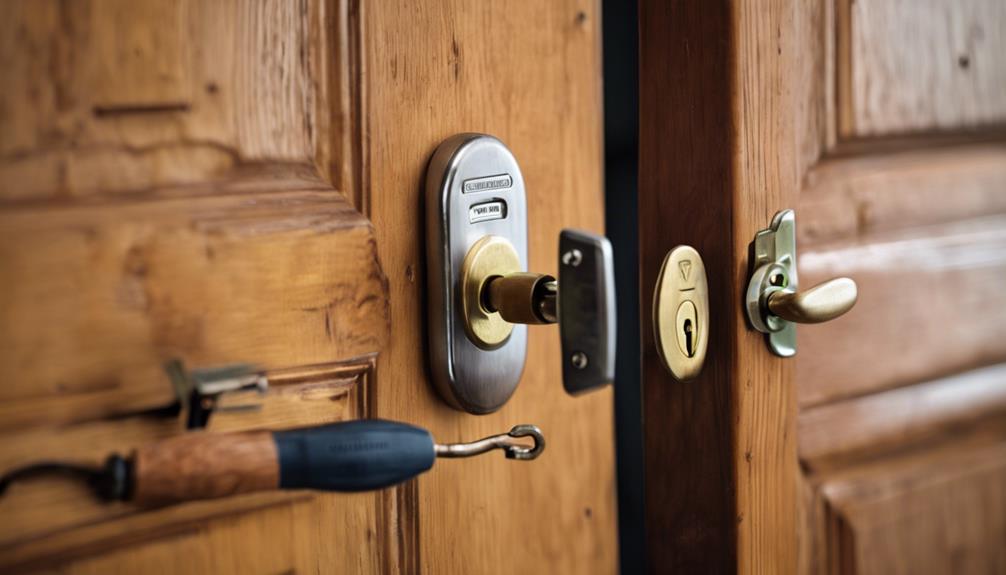To guarantee your locks meet insurance requirements, start by understanding your policy's specifications. Choose high-security locks, deadbolts, or smart locks that comply with recognized standards like ANSI or BHMA. Regularly inspect and maintain your locks for peak performance, and document all security measures, including installation dates and warranties. Proper installation is essential, so consider a professional locksmith to meet insurance guidelines effectively. By prioritizing quality and compliance, you can safeguard your home and potentially lower your premiums. There are even more strategies to enhance your security further.
Key Takeaways
- Check your insurance policy for specific lock requirements to ensure compliance and potentially lower premiums.
- Choose high-security locks or deadbolts that meet ANSI or UL ratings for enhanced protection.
- Consider smart locks and keyless entry systems that offer convenience while meeting insurance standards.
- Regularly evaluate and replace locks to maintain security and compliance with insurance regulations.
- Ensure proper installation and maintenance of locks to optimize performance and meet insurance criteria.
Understanding Insurance Requirements
When it comes to securing your home, understanding insurance requirements is fundamental for both protection and peace of mind. Local regulations and standards can vary greatly, so being informed about navigating local lock replacement regulations is essential. You want to guarantee that your property is safeguarded against theft or damage, and knowing these requirements can help you achieve that.
Many insurance policies specify lock insurance requirements that dictate the types of locks you need to have installed. By using insurance-compliant locks, you not only protect your home but also confirm that you're meeting your insurer's criteria. This compliance can greatly affect your premiums and claims process. It's important to check your policy documents or talk to your agent to understand what's expected.
Lock compliance insurance is another aspect to reflect on. This coverage can provide financial support in case your locks fail and lead to a loss. By being proactive and making sure your locks meet the necessary standards, you demonstrate your commitment to safety and responsibility.
In turn, you help create a safer environment for both yourself and your community. So, take the time to evaluate your locks and verify they align with your insurance requirements; it's a step toward safeguarding your home and serving others effectively.
Types of Locks for Homes
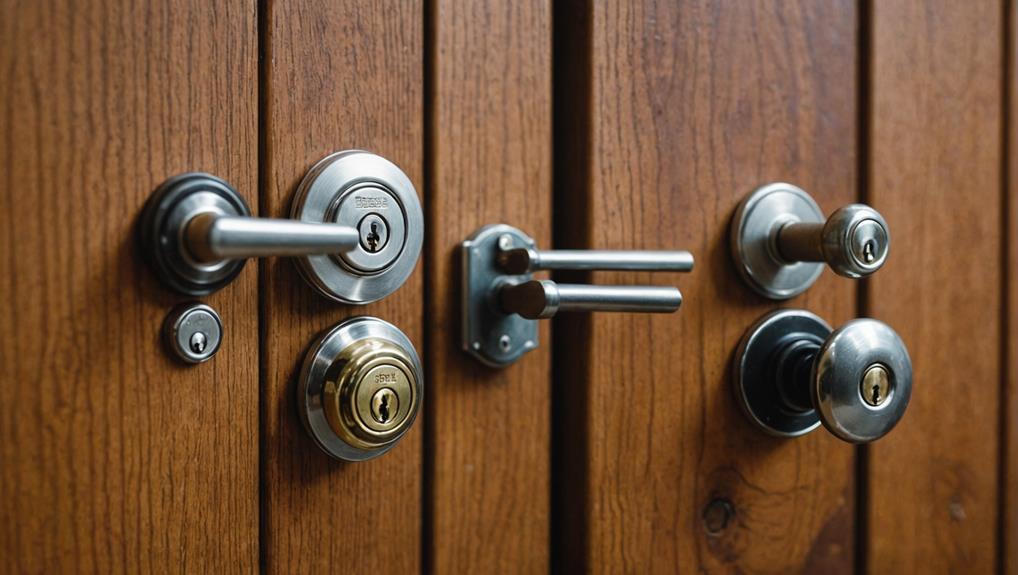
When it comes to securing your home, you've got several lock options to evaluate. High-security locks are an excellent choice, as they provide enhanced protection against unauthorized access due to their advanced mechanisms and resistance to picking and drilling.
Deadbolts provide strong protection, while smart locks offer convenience with their high-tech features. Keyless entry systems also add a layer of security and ease that you might find appealing.
For those looking to maximize safety, exploring the advantages of high-security locks is essential.
Deadbolt Lock Options
Deadbolt locks are often considered the gold standard for home security, providing a reliable barrier against unauthorized entry. When you're looking to enhance your home's safety, you'll want to verify your deadbolt meets insurance lock standards.
A single-cylinder deadbolt is a popular choice, featuring a keyhole on the exterior and a thumb turn on the inside. This option is user-friendly and effective, but if you have a glass door, consider a double-cylinder deadbolt for added security, as it requires a key on both sides.
When choosing insurance-approved locks, remember to check for certifications such as ANSI or UL ratings, as these indicate a lock's strength. If you're thinking about lock replacement for insurance purposes, opt for deadbolts that meet or exceed these standards. This not only protects your home but could also lower your insurance premiums.
Investing in quality deadbolt locks reflects your commitment to safety, reassuring your loved ones and neighbors. By selecting the right locks, you're taking an essential step toward creating a more secure environment for everyone.
Smart Lock Features
Smart locks are revolutionizing home security with their advanced features and convenience. They not only enhance your home's security but also offer various functionalities that can benefit you and those you serve. With smart locks, you can easily control access to your property, ensuring that only trusted individuals can enter.
One of the key features of smart locks is remote access. You can lock or open your doors from anywhere using a smartphone app, providing peace of mind when you're away. Additionally, many smart locks allow you to create temporary access codes for guests or service providers, ensuring that you can serve others without compromising your home's security.
Integration with home automation systems also enhances lock security for insurance. By syncing your smart lock with alarms or cameras, you can create a thorough security network. This not only protects your home but can also meet insurance requirements, potentially lowering your premiums.
Ultimately, choosing a smart lock is a proactive step towards safeguarding your home while serving those who enter it. Embracing these advanced features not only protects your property but also brings convenience to your everyday life.
Keyless Entry Systems
Keyless entry systems have taken home security to a new level, offering a variety of lock types that make traditional keys nearly obsolete. These systems not only enhance convenience but also provide added security for your home.
When considering a keyless entry system, it's crucial to understand the different types available:
- Keypad Locks: These require you to enter a numerical code, which means no more fumbling for keys.
- Smart Locks: These connect to your smartphone, allowing you to lock or open your door remotely.
- Biometric Locks: Using fingerprint recognition, these locks guarantee only authorized users gain access.
- Remote-Controlled Locks: Operated via a remote, these locks can be opened from a distance, perfect for busy hands.
When choosing a keyless entry system, verify it meets your insurance requirements. Insurers often prefer systems with advanced features that deter unauthorized access.
By selecting the right type, you not only enhance your home's security but also demonstrate a commitment to protecting your loved ones and serving your community.
Invest in a keyless entry system that combines convenience and safety for everyone's peace of mind.
Types of Locks for Businesses
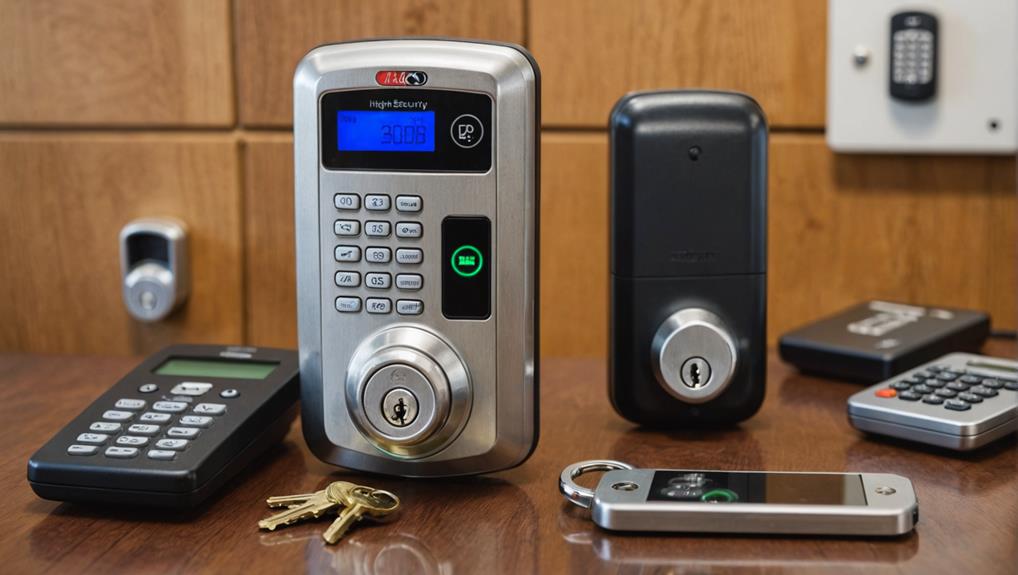
When it comes to securing your business, choosing the right type of lock is vital.
Regular lock replacements are essential for maintaining security and compliance with essential lock replacement best practices.
You'll want to take into account both standard lock options and high-security alternatives to protect your assets effectively.
Understanding these choices will help you meet insurance requirements and enhance overall security.
Standard Lock Types
To guarantee your business is secure and meets insurance requirements, it's essential to understand the various standard lock types available.
Choosing the right locks not only protects your assets but also gives peace of mind to you and your team. Here are four standard lock types to take into account:
- Deadbolt Locks: These provide a higher level of security than standard knob locks, requiring a key or thumb turn to open.
- Knob Locks: Commonly used for interior doors, they're easy to install but offer less security for exterior entry points.
- Lever Handle Locks: These are user-friendly, especially for those with mobility issues, and can be found in both residential and commercial applications.
- Padlocks: Versatile and portable, padlocks can secure gates, storage units, or lockers, making them a great choice for various business needs.
High-Security Lock Options
For businesses seeking enhanced security, high-security lock options are essential. These locks offer advanced features that go beyond standard models, providing peace of mind for you and your clients.
One popular choice is a restricted key system. With this option, only authorized personnel can duplicate keys, reducing the risk of unauthorized access.
Another effective option is electronic locks. They come with keypads or smart technology, allowing you to control access easily and track who enters your premises. You can customize permissions for different employees, ensuring that sensitive areas remain secure.
If you're looking for physical strength, consider deadbolts with high-grade ratings. These locks resist tampering and are tough against forced entry, making them an ideal fit for exterior doors.
Lastly, you might explore biometric locks that use fingerprints or facial recognition. Although they require an upfront investment, they provide unmatched security and ease of use.
Investing in high-security locks not only meets insurance requirements but also shows your commitment to safeguarding your business and those you serve.
Make the right choice today to protect your valuable assets and maintain trust in your organization.
ANSI/BHMA Standards Explained
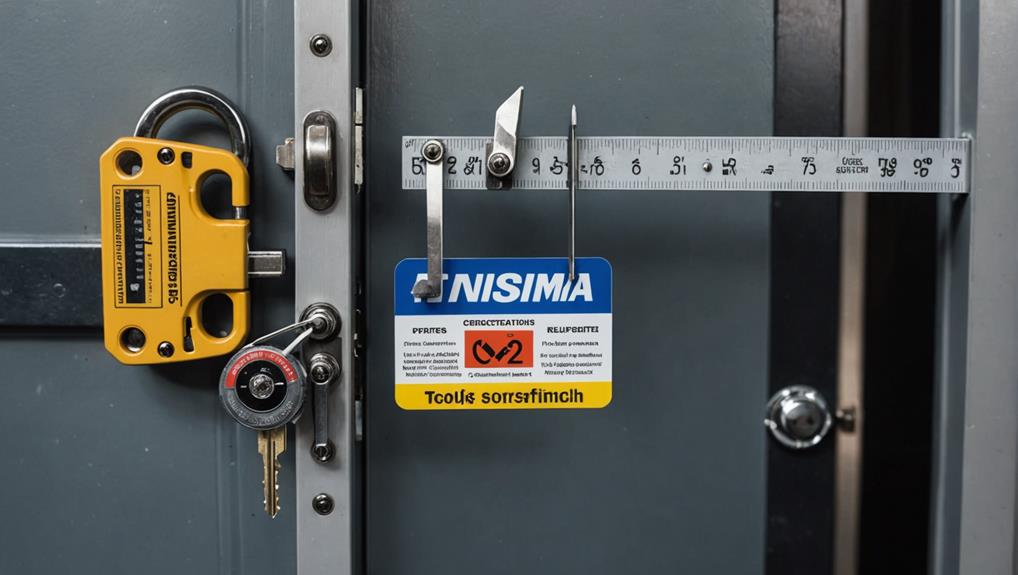
Understanding the ANSI/BHMA standards is vital if you want to guarantee your locks meet insurance requirements.
These standards, set by the American National Standards Institute and the Builders Hardware Manufacturers Association, help you choose locks that provide adequate security. By adhering to these guidelines, you can enhance safety for yourself and those you serve.
Additionally, selecting the right lock can greatly impact your overall home security and insurance premiums, making it essential to stay informed about choosing the perfect lock.
Here are four key aspects of ANSI/BHMA standards you should know:
- Durability: Locks are tested for wear and tear, confirming they withstand daily use.
- Security Ratings: Different grades (1 through 3) indicate the level of security, with Grade 1 being the highest.
- Functionality: Standards confirm that locks operate properly under various conditions, providing reliable access.
- Compatibility: ANSI/BHMA standards promote uniformity in hardware, making it easier to find compatible components.
Features of Secure Locks
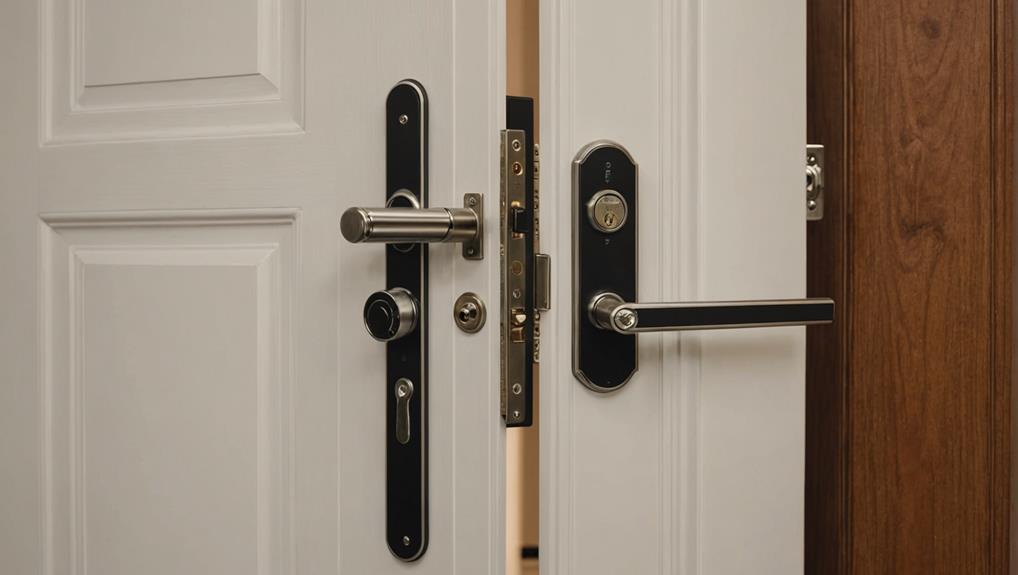
Choosing the right lock goes beyond just meeting ANSI/BHMA standards; it also involves recognizing the key features that make a lock truly secure.
First, consider the material. High-quality locks are often made from hardened steel or brass, which resist tampering and wear. Additionally, when selecting locks, it's essential to prioritize security and informed choices to guarantee they can withstand various break-in attempts.
Look for locks with anti-drill and anti-pick features, as these add layers of protection against common break-in methods.
Next, pay attention to the locking mechanism. A deadbolt offers superior security compared to a standard spring latch, as it extends deep into the door frame. You should also explore smart locks, which provide additional layers of security through encryption and remote access controls.
Don't overlook the importance of installation. Even the best lock won't protect you if it's poorly installed. Confirm your locks are fitted correctly and maintain them regularly to keep them in prime condition.
In the end, prioritizing these features not only secures your property but also serves your community by fostering a safer environment for everyone.
Assessing Lock Quality
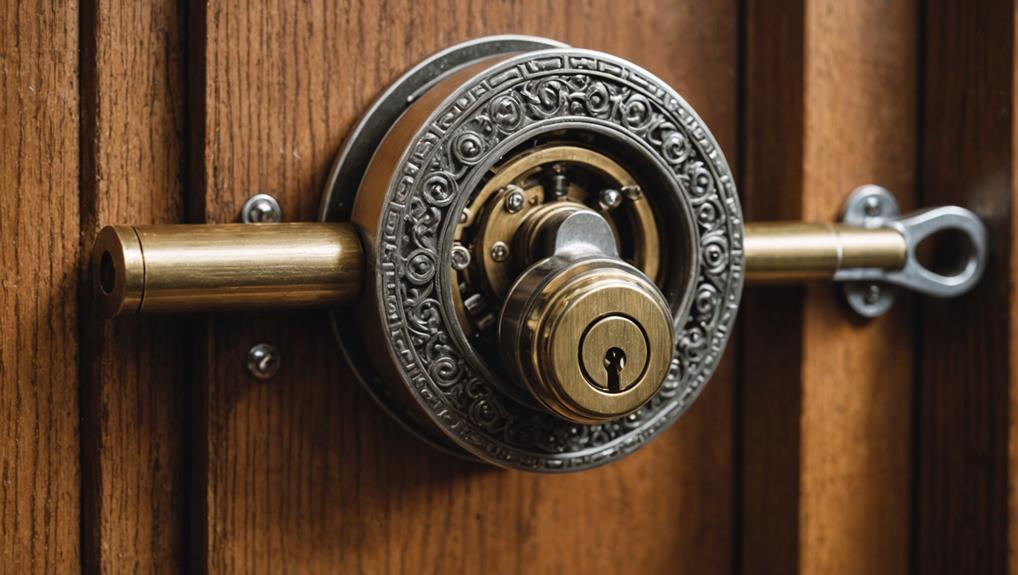
While it might be tempting to grab the first lock you see, evaluating lock quality is essential for guaranteeing your home's safety. High-quality locks not only protect your belongings but also contribute to the peace of mind of those you care for.
Additionally, consider the benefits of lock re-keying, as it allows you to maintain security without the expense of replacing locks. Here are four key factors to assess when choosing locks:
- Material: Look for locks made from durable materials like solid brass or hardened steel. These materials resist wear and tear, helping to deter intruders.
- Certification: Check for certification from recognized standards, such as ANSI (American National Standards Institute) or BHMA (Builders Hardware Manufacturers Association). These certifications indicate that the lock has passed rigorous testing.
- Mechanism: Opt for locks with advanced mechanisms, like deadbolts or smart locks. These provide added security compared to standard spring latches.
- Warranty: A solid warranty speaks to a manufacturer's confidence in their product. Look for locks that come with a warranty to guarantee you're covered in case of defects.
Installation Best Practices
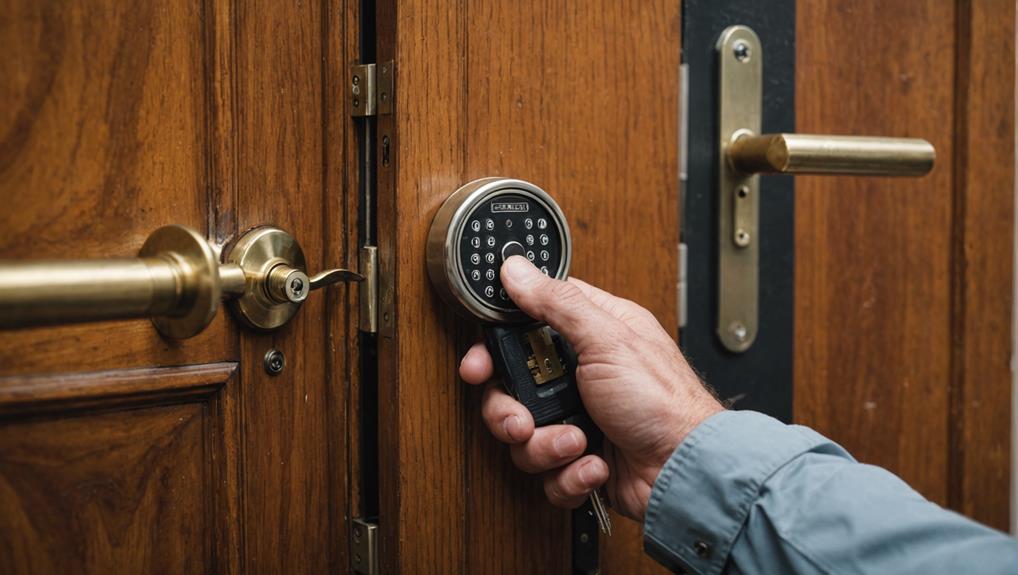
Proper installation of your locks is essential for guaranteeing their effectiveness and meeting insurance requirements.
To start, always choose a professional locksmith who understands the specific standards set by your insurance provider. They'll help guarantee the lock is appropriate for your door type and security needs, which can vary based on the costs involved in hiring a professional.
Next, make sure the lock is installed at the correct height. Most experts recommend placing it around 36 inches from the ground, making it accessible yet secure. When installing deadbolts, position them at least 40 inches above the floor to deter unauthorized access.
Confirm that the strike plate is properly aligned with the lock. A misaligned strike plate can compromise your lock's security, so double-check its fit.
Additionally, drill pilot holes for screws to prevent the wood from splitting, which can weaken the door frame.
Regular Maintenance Tips
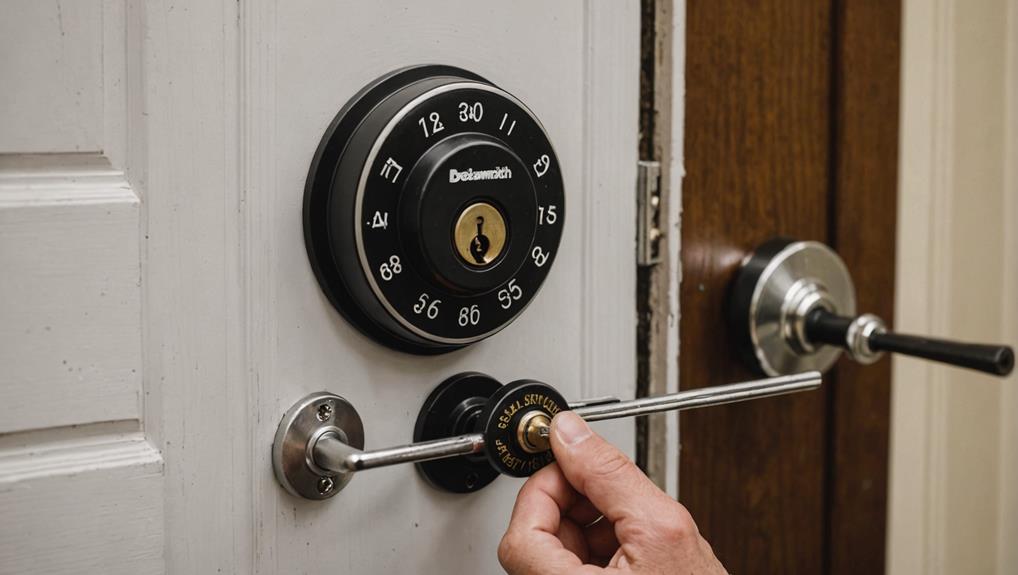
Even the best-installed locks require regular maintenance to confirm they continue to meet insurance standards and provide ideal security.
Regular checks can help identify issues before they escalate, making it essential to understand how to handle problems like sticking locks mastering sticking locks.
By taking the time to care for your locks, you not only protect your property but also serve those who rely on your commitment to safety.
Here are some essential maintenance tips to keep in mind:
- Lubricate Regularly: Use a silicone-based lubricant on the keyhole and lock mechanisms every six months to prevent rust and confirm smooth operation.
- Inspect for Wear: Check your locks for any signs of damage, such as cracks or loose components. If you notice anything unusual, replace the lock immediately to maintain security.
- Test Functionality: Regularly test each lock to confirm it opens and closes smoothly. If you experience resistance, investigate the cause and address it promptly.
- Clean the Area: Keep the surrounding area of the lock clean and free from debris. This prevents buildup that can compromise the lock's performance.
Documenting Your Security Measures
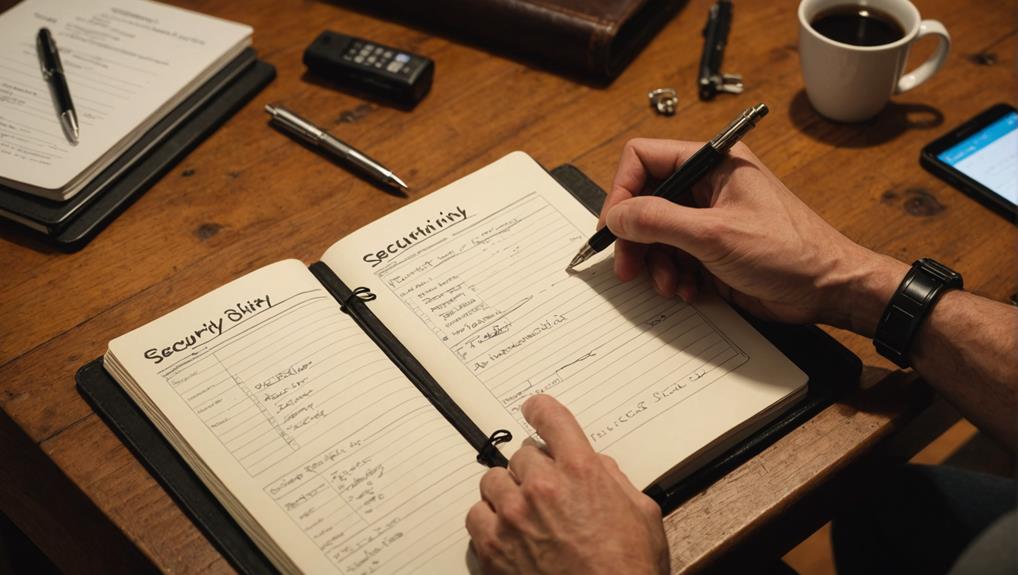
Your security measures play an essential role in protecting your property and meeting insurance requirements. To guarantee you're covered, documenting these measures is vital.
Start by keeping a detailed record of all locks and security devices you've installed. This includes brand names, model numbers, and installation dates. If you've recently re-keyed any locks, note the costs involved as it can reflect your commitment to security, especially if you opted for understanding lock re-keying costs to enhance safety.
Next, gather receipts and warranties for each lock or security system purchased. This documentation not only serves as proof of ownership but can also be valuable during claims processes.
Don't forget to note any upgrades or changes you make over time. This way, you can show your insurance company that you're committed to maintaining a secure environment.
Additionally, consider taking photos of your security features. Visual documentation can support your written records and provide clarity on what's in place.
Keep everything organized in a secure location, whether digitally or in a physical file.
Frequently Asked Questions
Can I Use Smart Locks to Meet Insurance Requirements?
Yes, you can use smart locks to enhance your home security.
They offer advanced features like remote access, alerts, and keyless entry, making it easier for you to manage access for family and friends.
Just be sure to choose a lock that's reputable and meets industry standards.
Always check with your insurance provider to confirm if specific smart locks fulfill their requirements, ensuring you're fully covered while keeping your home secure.
What Is the Minimum Grade for Residential Locks?
When you think of your home's security, the lock is the sturdy shield guarding against unwanted intruders.
For residential locks, you'll want at least a Grade 1 or Grade 2 rating. Grade 1 locks offer the highest security, perfect for exterior doors, while Grade 2 locks provide a solid defense for interior access points.
Choosing the right lock not only protects your space but also gives peace of mind to those you care for.
Do Insurance Companies Accept Locks With Digital Keypads?
Insurance companies often accept locks with digital keypads, but it varies by provider. You should check with your insurer to confirm their specific requirements.
Digital keypads can offer convenience and enhanced security, making them a popular choice. Just verify the lock meets industry standards and is installed correctly.
Keeping your home secure is a priority, so it's smart to stay informed about what your insurance policy covers regarding lock types.
How Often Should I Update My Locks for Insurance Compliance?
Updating your locks regularly isn't just about security; it's also a commitment to those you care for.
Ideally, you should replace your locks every five to seven years or sooner if they show signs of wear. Consider updating them after a break-in or if you've lost keys.
This proactive approach not only protects your home but also reassures your loved ones that you're prioritizing their safety.
Are There Specific Brands Recommended by Insurance Companies?
When it comes to securing your home, insurance companies often recommend specific brands known for their reliability and durability.
Brands like Schlage, Kwikset, and Yale are frequently highlighted for their high-quality locks.
It's crucial to choose locks that not only meet your security needs but also align with your insurance policy requirements.
Make sure to check with your insurer for any specific recommendations to keep your home safe and compliant.
Conclusion
By ensuring your locks meet insurance requirements, you're not just protecting your property; you're also safeguarding your peace of mind. You might think upgrading locks is costly, but the potential savings on insurance premiums can more than offset the investment. Plus, secure locks can deter break-ins and lower your risk of theft. So, take the time to assess your locks and make necessary changes—it's a small step that could save you a lot in the long run.

